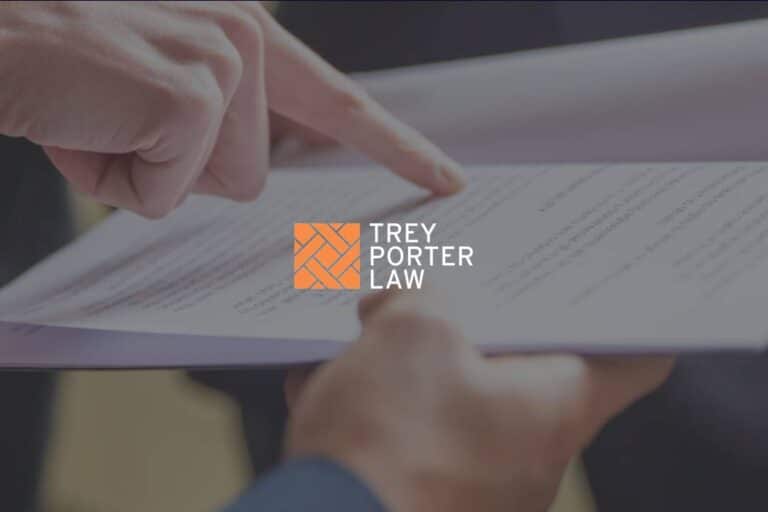
WHAT CRIMINAL RECORDS CAN BE SEALED IN TEXAS?
Criminal arrests, probation records, misdemeanors, felonies, DWI cases, drug charges, and white collar crimes can be sealed in Texas. There are hundreds of criminal offenses in Texas law. Even petty charges from the Texas Penal Code can result in a devastating public record.
A Petition for a Nondisclosure Order is a legal tool that seals the public record of qualifying criminal offenses. The order prevents public agencies, including law enforcement and court clerks, from releasing details of the sealed case – a tremendous advantage for professionals contemplating a career move, or for anyone looking to move beyond their past!
Most criminal charges are eligible for an Order of Nondisclosure after successful completion of Deferred Adjudication. Additionally, many first-time misdemeanor convictions also qualify for sealing by Nondisclosure Order.
- What are common ways to seal your record in Texas? The common ways to seal a criminal record by a Nondisclosure Order are listed in the Texas Government Code, and depend on the circumstances of the original case. Basically, the code provides different procedures that are determined by how the charge is resolved.The law also provides specific rules that determine if you are eligible to seal your criminal record in Texas.
NONDISCLOSURE ORDER ELIGIBILITY FACTORS IN TEXAS
With some exceptions, Texas Defendants are frequently eligible to seal their records in the following situations:
- The Defendant completed Deferred Adjudication within 180 days for a nonviolent misdemeanor and has no prior criminal history.
- The Defendant completed Deferred Adjudication for a felony or certain misdemeanor charges.
- The Defendant completed Deferred Adjudication for misdemeanor Driving While Intoxicated or Boating While Intoxicated and has no other criminal history.
- The Defendant completed a Veterans Treatment Court program, has no prior serious criminal history, and is not convicted of a felony within 2 years of the date of completion.
- The Defendant completed Community Supervision Probation for a misdemeanor and has no other criminal history.
- The Defendant, who has no other criminal history, completed Community Supervision Probation for misdemeanor Driving While Intoxicated and there was no traffic collision involving another vehicle and the BAC was lower than 0.15 percent.
- The Defendant is convicted of a misdemeanor and has no other criminal history.
- The Defendant, who has no other criminal history, is convicted of a misdemeanor Driving While Intoxicated and there was no traffic collision involving another vehicle and the BAC (Blood Alcohol Content ) was lower than 0.15 percent.
As a final eligibility guideline: there is a mandatory waiting period before an individual can seal their record – and, most importantly, any criminal conviction or Deferred Adjudication during the waiting period is a disqualification for eligibility!
HOW LONG DO YOU HAVE TO WAIT TO SEAL YOUR RECORD IN TEXAS?
The Order of Nondisclosure waiting period varies depending on the nature of the case, as follows.
FOR CASES RESOLVED BY DEFERRED ADJUDICATION THE WAITING PERIOD IS:
| FELONY | All | 5 years from dismissal |
| MISDEMEANOR | UNLAWFUL RESTRAINT | 2 years from dismissal |
| MISDEMEANOR | OPERATION OF STASH HOUSE | 2 years from dismissal |
| MISDEMEANOR | PUBLIC LEWDNESS | 2 years from dismissal |
| MISDEMEANOR | INDECENT EXPOSURE | 2 years from dismissal |
| MISDEMEANOR | VOYEURISM | 2 years from dismissal |
| MISDEMEANOR | UNLAWFUL ELECTRONIC TRANSMISSION OF SEXUALLY EXPLICIT VISUAL MATERIAL | 2 years from dismissal |
| MISDEMEANOR | ASSAULT | 2 years from dismissal |
| MISDEMEANOR | INDECENT ASSAULT | 2 years from dismissal |
| MISDEMEANOR | DEADLY CONDUCT | 2 years from dismissal |
| MISDEMEANOR | TERRORISTIC THREAT | 2 years from dismissal |
| MISDEMEANOR | AIDING SUICIDE | 2 years from dismissal |
| MISDEMEANOR | LEAVING A CHILD IN A VEHICLE | 2 years from dismissal |
| MISDEMEANOR | ENTICING A CHILD | 2 years from dismissal |
| MISDEMEANOR | HARBORING RUNAWAY CHILD | 2 years from dismissal |
| MISDEMEANOR | VIOLATION OF PROTECTIVE ORDER PREVENTING OFFENSE CAUSED BY BIAS OR PREJUDICE | 2 years from dismissal |
| MISDEMEANOR | ADVERTISING FOR PLACEMENT OF CHILD | 2 years from dismissal |
| MISDEMEANOR | DISORDERLY CONDUCT | 2 years from dismissal |
| MISDEMEANOR | RIOT | 2 years from dismissal |
| MISDEMEANOR | OBSTRUCTING HIGHWAY OR OTHER PASSAGEWAY | 2 years from dismissal |
| MISDEMEANOR | DISRUPTING MEETING OR PROCESSION | 2 years from dismissal |
| MISDEMEANOR | FUNERAL SERVICE DISRUPTIONS | 2 years from dismissal |
| MISDEMEANOR | FALSE ALARM OR REPORT | 2 years from dismissal |
| MISDEMEANOR | SILENT OR ABUSIVE CALLS TO 9-1-1 SERVICE | 2 years from dismissal |
| MISDEMEANOR | INTERFERENCE WITH EMERGENCY REQUEST FOR ASSISTANCE | 2 years from dismissal |
| MISDEMEANOR | HARASSMENT | 2 years from dismissal |
| MISDEMEANOR | DISCLOSURE OF CONFIDENTIAL INFORMATION REGARDING FAMILY VIOLENCE OR VICTIMS OF TRAFFICKING SHELTER CENTER | 2 years from dismissal |
| MISDEMEANOR | ABUSE OF CORPSE | 2 years from dismissal |
| MISDEMEANOR | CRUELTY TO LIVESTOCK ANIMALS | 2 years from dismissal |
| MISDEMEANOR | ATTACK ON ASSISTANCE ANIMAL | 2 years from dismissal |
| MISDEMEANOR | CRUELTY TO NONLIVESTOCK ANIMALS | 2 years from dismissal |
| MISDEMEANOR | DOG FIGHTING | 2 years from dismissal |
| MISDEMEANOR | COCKFIGHTING | 2 years from dismissal |
| MISDEMEANOR | DESTRUCTION OF FLAG | 2 years from dismissal |
| MISDEMEANOR | DISCHARGE OF FIREARM IN CERTAIN MUNICIPALITIES | 2 years from dismissal |
| MISDEMEANOR | USE OF LASER POINTERS | 2 years from dismissal |
| MISDEMEANOR | ILLUMINATION OF AIRCRAFT BY INTENSE LIGHT | 2 years from dismissal |
| MISDEMEANOR | PROSTITUTION | 2 years from dismissal |
| MISDEMEANOR | OBSCENE DISPLAY OR DISTRIBUTION | 2 years from dismissal |
| MISDEMEANOR | OBSCENITY | 2 years from dismissal |
| MISDEMEANOR | SALE, DISTRIBUTION, OR DISPLAY OF HARMFUL MATERIAL TO MINOR | 2 years from dismissal |
| MISDEMEANOR | ELECTRONIC TRANSMISSION OF CERTAIN VISUAL MATERIAL DEPICTING MINOR | 2 years from dismissal |
| MISDEMEANOR | UNLAWFUL CARRYING WEAPONS | 2 years from dismissal |
| MISDEMEANOR | PLACES WEAPONS PROHIBITED | 2 years from dismissal |
| MISDEMEANOR | UNLAWFUL POSSESSION OF FIREARM | 2 years from dismissal |
| MISDEMEANOR | UNLAWFUL TRANSFER OF CERTAIN WEAPONS | 2 years from dismissal |
| MISDEMEANOR | HOAX BOMBS | 2 years from dismissal |
| MISDEMEANOR | MAKING A FIREARM ACCESSIBLE TO A CHILD | 2 years from dismissal |
| MISDEMEANOR | THEFT | No waiting period after dismissal |
| MISDEMEANOR | RESISTING ARREST | No waiting period after dismissal |
| MISDEMEANOR | RACING ON HIGHWAY | No waiting period after dismissal |
| MISDEMEANOR | RECKLESS DRIVING | No waiting period after dismissal |
| MISDEMEANOR | POSSESSION OF MARIJUANA | No waiting period after dismissal |
| MISDEMEANOR | BURGLARY OF VEHICLES | No waiting period after dismissal |
| MISDEMEANOR | ALL OTHER NON-DWI MISDEMEANORS | No waiting period after dismissal |
| FELONY | All | 5 years from dismissal |
FOR DWI CASES, THE FOLLOWING ELIGIBILITY RULES AND WAITING PERIODS APPLY:
| DISPOSITION | Eligibility | Waiting Period |
| DEFERRED ADJUDICATION | Eligible if no evidence of accident involving another person. | 2 years from dismissal |
| CONVICTION – PROBATION | Eligible if no evidence of accident involving another person and did not plea to .15 BAC. | 2 years from end of sentence if defendant had ignition interlock for at least 6 months |
| 5 years from end of sentence if defendant did not have ignition interlock for at least 6 months | ||
| CONVICTION – JAIL | Eligible if no evidence of accident involving another person and did not plea to .15 BAC. | 3 years from end of sentence if defendant had ignition interlock for at least 6 months |
| 5 years from end of sentence if defendant did not have ignition interlock for at least 6 months |
As a reminder, Nondisclosure is only available for Driving While Intoxicated and Boating While Intoxicated offenses if the defendant has never before been convicted or placed on deferred adjudication for any offense other than a traffic offense.
FOR NON-DWI OFFENSES RESULTING IN CONVICTION, THE FOLLOWING ELIGIBILITY RULES AND WAITING PERIODS APPLY:
| DISPOSITION | OFFENSE LEVEL | ELIGIBILITY |
| COMMUNITY SUPERVISION | Any Felony | Not Eligible |
| Any Misdemeanor | Eligible subject to waiting periods in Deferred Adjudication table above | |
| NO COMMUNITY SUPERVISION | Any Felony | Not Eligible |
| Class A or B Misdemeanor | 2 years from end of sentence | |
| Class C Misdemeanor | No waiting period from end of sentence |
As a reminder, Nondisclosure is only available after a conviction if the defendant has never before been convicted or placed on deferred adjudication for any offense other than a traffic offense.
HOW TO GET YOUR RECORD SEALED IN TEXAS?
Sealing a criminal case in Texas requires the filing of a Petition for an Order of Nondisclosure of Criminal History. The petition must be filed into the trial court of record, and otherwise comply with the Texas Government Code.
After an opportunity for a hearing (where the prosecutor can appear), the judge decides whether to grant the Nondisclosure Order.
- What criminal records are public in Texas? All arrest records and court data including acquittal, conviction, and probation sentences are public record no matter the charge. Police reports are also often entered into the public record. These can contain sensitive and problematic details of a criminal offense.These are very obvious reasons why a person should seal their record as soon as eligible!
- How far back does a criminal background check go in Texas? All the way back! All charges will appear on a criminal background check in Texas.
WILL A SEALED RECORD SHOW UP ON A BACKGROUND CHECK IN TEXAS?
A properly sealed criminal record will not appear on a public background check conducted by private organizations like a private employer.
However, sealed Nondisclosure records will appear to a law enforcement officer and certain state and federal agencies, including the Texas Department of Public Safety (DPS) and the Federal Bureau of Investigation (FBI). Texas law exempts these agencies from the Nondisclosure rules.
- Who can see sealed records in Texas? Texas police officers, law enforcement agents, prosecutors, and certain judicial officers can see criminal records sealed by Nondisclosure Order.Additionally, state law allows sealed records to be disclosed to certain government agencies that regulate a professional employment license, like the State Bar of Texas and the Texas Medical Board.A full list of these state agencies may be found in Texas Government Code statute 411.0765.
WHAT IS THE SECOND CHANCE LAW IN TEXAS?
The Texas Second Chance Law is a law that allows many first-time offenders (including those with misdemeanor DWI convictions) to seal their records with an Order of Nondisclosure.
The state passed this law in 2017 and it is retroactive, which means it applies to older cases.
WHAT CRIMES CANNOT BE SEALED IN TEXAS?
Several serious felony offenses and crimes involving domestic violence are ineligible for a Nondisclosure Order under Texas Law.
Additionally, a person cannot seal their record if they were convicted or placed on Deferred Adjudication for any offense while already on deferred, or during the mandatory Nondisclosure waiting period.
Individuals who are convicted of or placed on Deferred Adjudication for the following offenses are not eligible to seal any criminal history, including unrelated, minor misdemeanors:
- Any offense requiring sex offender registration
- Aggravated Kidnapping
- Capital Murder or Murder
- Trafficking of Persons or Continuous Trafficking of Persons
- Injury to a Child, Elderly Individual or Disabled Individual
- Violation of Certain Court Orders or Conditions of Bond in a Family Violence, Child Abuse or Neglect, Sexual Assault or Abuse, Indecent Assault, Stalking, or Trafficking Case
- Repeated Violation of Certain Court Orders or Conditions of Bond in a Family Violence, Child Abuse or Neglect, Sexual Assault or Abuse, Indecent Assault, Stalking, or Trafficking Case
- Stalking
- Any offense involving Family Violence
- What felonies cannot be sealed in Texas? Felony convictions cannot be sealed in Texas. Deferred Adjudication cases involving the offenses above are also ineligible for a Nondisclosure Order.
Additionally, an individual who is convicted or placed on Deferred Adjudication for any offense while already serving felony Deferred Adjudication is not eligible to seal the instant charge.
- Does a felony ever go away in Texas? No, felony charges do not ever go away by themselves. There is no Texas 7 year rule where charges automatically disappear from a person’s record.
The only way to clean up a felony record in Texas is by Expunction or Nondisclosure Order.
HOW MUCH DOES IT COST TO SEAL YOUR RECORD IN TEXAS?
It costs up to approximately $5,000 to seal a criminal record in Texas. This amount typically includes attorney fees and court costs.
Nondisclosure costs will ultimately vary depending on the severity of the charge and the jurisdiction.
HOW LONG DOES IT TAKE TO GET YOUR RECORD SEALED IN TEXAS?
It takes approximately 3 to 6 months to fully seal a criminal record in Texas as court dockets and criminal justice agency clerks can get backed up in some counties.
Those seeking to Petition for a Nondisclosure Order should note the mandatory waiting periods before they can seal their records – these will vary from 2 to 5 years depending on the nature and severity of the charge.
- How long does a criminal record last in Texas? Criminal records are permanent in Texas. Charges do not automatically disappear!
The only way to clean up a criminal record is by expungement or Nondisclosure Order in Texas.
CAN I SEAL MY DWI RECORD IN TEXAS?
Yes, DWI records are sealed every day in Texas Courts! Those seeking to seal a DWI record in Texas should be aware that DWI Nondisclosure Orders have very specific eligibility requirements and waiting periods.
- How much does it cost to seal a DWI record in Texas? DWI Nondisclosure costs can reach up to approximately $5,000, though these fees will vary across Texas.
- Does a DUI stay on your record forever in Texas? Yes, Texas DUI cases stay on criminal records forever, even when charges are dismissed! DUI minor under 21 charges also remain permanently on Texas criminal records.
The only way to clear your Texas DUI record is by expungement or nondisclosure order.
CAN A DUI BE SEALED IN TEXAS?
Yes, many first-time DWI charges can be sealed in Texas.
Texas minors who resolved their under 21 Driving Under the Influence (DUI minor under 21) by Deferred Disposition can even clear and delete all records of the charge!
- How do I clear my criminal record in Texas? Texans and minors under 21 can clear their criminal records in Texas by seeking an Expunction.
- What is the difference between sealed and expunged in Texas? An expungement is frequently only available when a case is dismissed without probation or a final conviction. This powerful legal tool deletes all records of a case.
A case that is sealed by Nondisclosure Order is not deleted, the state is just prohibited from disclosing the criminal history in public records. Nondisclosure Orders are available in many Deferred Adjudication and probation cases.
WHY ARE SOME CASES SEALED?
There is really no good reason against sealing criminal records in Texas as it provides immeasurable advantages for any individual. Sealed crimes do not appear on public background checks, including during employment interviews and when seeking a residential lease.
Individuals with cost concerns should consult an experienced Texas criminal defense lawyer as many offer free case evaluations and payment plans.
- Can I buy a gun with a sealed record in Texas? Yes, as long as the sealed offense is not a gun right disqualification and the individual is not otherwise prohibited from owning a firearm.
Gun enthusiasts should note that sealed cases will appear on gun purchase background checks in Texas.
BEST LAWYERS FOR NONDISCLOSURE IN TEXAS
Trey Porter Law is a top-rated Texas law firm with 40+ years of combined experience successfully sealing criminal charges across the Lone Star state. The award-winning Criminal Defense attorneys at TPL understand that criminal records can negatively impact background checks, security clearances, and school admissions. Trey Porter Law leverages experience, professional relationships, and dynamic, high-powered advocacy to get the best result for every client, every time.

















